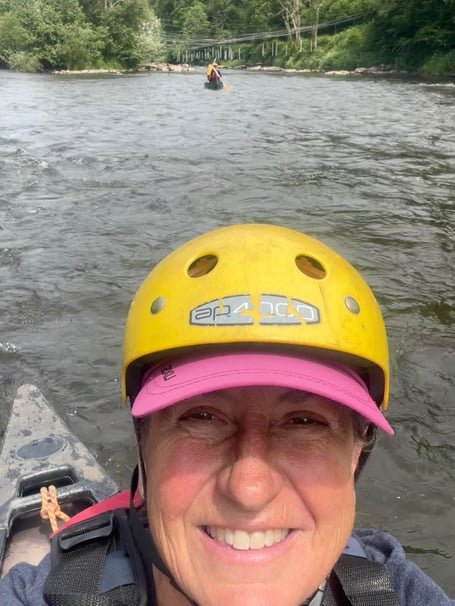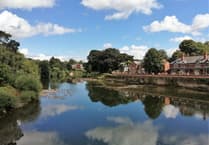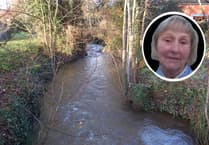A LEGAL claim challenging river pollution in the River Wye has been filed at the High Court.
The court action, which almost 4,000 people have joined, is against industrial chicken production firms, Avara Foods Limited and Freemans of Newent Limited as well as sewage company Welsh Water, who are blamed for extensive and widespread pollution in the River Wye and the River Lugg and their tributaries.
The three companies have denied the claims to law firm Leigh Day, which represents the claimants. Now the claims have been served on the companies, and the particulars of claim are with the High Court.
Avara, Freemans and Welsh Water must now file a defence and, unless the claim is settled, it will be heard in a civil trial at the High Court.
The claimants are all residents, local business owners, or people who use the rivers Wye, Usk and Lugg for leisure and family time. They include people with riverside properties or fishing rights and other householders or tenants who live or run businesses near to intensive poultry units, chicken growing farms or sewerage infrastructure.
Businesses who rely on local tourism and river activities have also joined the claim.
All allege that the three companies are responsible for river pollution and the severe impact it has had on businesses, recreation, tourism and property values since August 2019 and ask the court to award substantial damages for that period.
They also ask the court to order all three companies to clean up the rivers and restore them to health.
The claim against Avara, Freemans and Welsh Water alleges that pollution has been caused by water run-off from farmland containing high concentrations of phosphorus, nitrogen and bacteria resulting from the spreading of thousands of tonnes of poultry manure and sewage bio solids.
It also alleges bacteria, and nutrient pollution has been caused by the discharge of sewage directly into the rivers from Welsh Water sewerage systems.
Justine Evans is the lead claimant. She works in wildlife film making for international broadcasters and moved to the Wye area in 2012.
Ms Evans recalls that the River Wye used to be clear, with the natural growth of plants and wildlife on and beneath its surface easily visible. But in recent years, she has seen a stark decline in its condition.
Around the time of the Covid pandemic, Justine observed a large algal bloom which gave the river a pea soup appearance.
Ms Evans said: “My relationship with the river has completely changed, to the point I no longer feel comfortable going in it. It’s horrible to think what has happened to the wildlife it is home to.
“Children are growing up seeing the river now as it is now thinking this is its normal state, but it’s just not what rivers should look like. The feeling of contentment I used to get from being in the river has all but disappeared.”
Lawyers at Leigh Day see this as the culmination of an extraordinary effort by local community members and campaign groups to research, monitor and advocate for their rivers.
A Welsh Water spokesperson said:“Welsh Water is a not-for-profit company, unlike other water companies. The amount we can charge for our services is subject to regulatory control, which therefore limits the funds available to us for re-investing into our infrastructure. Despite these financial constraints, we have made significant investments over recent years, and we have achieved real improvements in water quality.
“In the past five years we have delivered £70 million of investment to improve our sites on the Wye River – and delivered them ahead of the target set by our regulators. We are also currently investing £33 million to improve the Usk River. Unfortunately, the water pollution caused by other sectors during this period has increased significantly, reducing the overall impact of the water quality improvements we have achieved.
“We intend to defend this case robustly: the fact that we are a not-for-profit company means that any payments to these claimants would necessarily reduce the amount that we can re-invest in delivering further improvements for the benefit of all of our customers and the environment.”
A spokesperson for Avara Foods said: “We share concerns about the condition of the River Wye, but we believe that this legal claim is based on a misunderstanding, as no manure is stored or spread on poultry-only farms that supply Avara Foods. Where poultry manure is used as fertiliser, it is for other produce in other agricultural sectors. Individual farmers are responsible for how nutrients are used in their arable operations.
“Avara is not involved in any arable operations and has no control over this activity. All our poultry is produced in Britain to standards that are amongst the highest in the world. The focus instead needs to be on solutions that will improve the health of the river, addressing all forms of pollution and the effects of climate change, and for action to be taken accordingly. We employ 5,000 people in the UK and approximately 1,500 people in the catchment area, and we all want a healthy River Wye."





Comments
This article has no comments yet. Be the first to leave a comment.